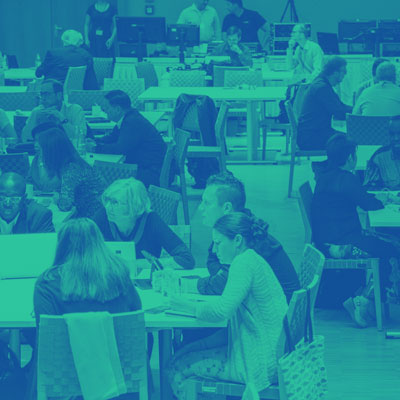The Lausanne Leadership Journey (LLJ) is a new endeavour that seeks to impact the next generation of Christian leaders who will be the global leaders and influencers in the year 2050.
The vision for LLJ came by looking at the impact Billy Graham and John Stott had on the global church in bringing together hundreds and thousands of believers from around the world who would be committed to help finish the Great Commission.
‘What could we do to help identify, equip, train, develop and encourage, shape, mould, and sharpen a new generation of leaders from the global church?’ asks Rick Franklin, vice president of Arrow Leadership Ministries and co-chair of LLJ.
Structured to accommodate two younger leaders from each of the 12 regions associated with Lausanne, the goal of LLJ is to have 24 people participate in the programme every year. The programme is not heavily focused on academics and accreditation, but instead fosters an experiential, relational journey that aims to nurture leaders in spiritual maturity, confidence in who they are in Christ and what he has called them to, greater courage to lead boldly, and ability to lead in the globalised world of today.
ARTICLE
Who’s Next After Billy Graham?
Collaboration, not individual celebrity, is propelling today’s evangelism movement.
The Lausanne Movement has historically invested in emerging leaders, particularly with the Younger Leaders Generation (YLGen) initiative currently overseen by Nana Yaw Offei Awuku. He has not only been a cheerleader, but a champion for LLJ and its development.
‘LLJ is a completely new endeavour for Lausanne,’ says Franklin. ‘Lausanne has been phenomenal at hosting events, curating material, and creating issue groups around specific issues, but LLJ is unlike any of those initiatives.’
He continues, ‘The Lausanne Leadership Journey is something revolutionary to Lausanne in the sense that it is an 18-month experiential journey to develop emerging global leaders.’
The programme will include some reading and curriculum curated from expert trainer practitioners, lots of hands-on experiential learning, relationship building, as well as two gatherings in-person over the 18-month programme. ‘Our goal is to host those in June of each year,’ says Franklin. ‘The location would likely move each year so that it reflects and represents the global cohort of participants.’
The global cohort of participants is the main feature that sets LLJ apart from most other leadership development programmes, which tend to be anchored either nationally or denominationally or cater for a particular organisation.
‘The vision for LLJ is broader,’ says Franklin. ‘It will be comprised of leaders, mentors, and specialist trainers from around the world.’ The goal is to see a leadership development programme for key leaders around the whole world, hosted and facilitated by the whole world.
Friendships and Mentors
A pilot test for LLJ was held in June 2022 with seven leaders representing nearly every continent and facilitated by trainers from a host of different countries.
‘We had Michael Oh, Nana Yaw Offei Awuku, Ole-Magnus Olafsrud, and Evi Rodemann in the hot seat,’ recalls Franklin, ‘They all shared their stories in a manner which was very open, very honest, very raw, and very appreciated by all the participants.’

LLJ pilot participants with Michael Oh (far left) and Menchit Wong (third from left) in June 2022.
The participants in the pilot project had a chance to connect with all the regional directors and the board members, all of whom were very generous in giving of their time and capacity to meet and connect with these younger leaders.
‘The goal over the eighteen months is for a leader to have the space to be open and transparent, to bring successes, to bring failures, and a safe place to ask questions,’ Franklin explains. ‘It will create the opportunity to have leaders pour into other leaders, be that peers, mentors or trainers. This will allow these younger leaders to develop a network of relationships around the world.’
There is a special emphasis on developing friendships between LLJ participants. Every other month, gatherings of 4-5 participants meet in friendship circles to deepen friendships, enhance spiritual transformation, and engage and encourage one another. And each month, LLJ participants meet in pairs for accountability.
The participants in the pilot programme greatly appreciated and gravitated towards the friendship circles. Many of the younger leaders expressed how they feel very isolated and alone in leadership, and having a safe space to share their challenges and struggles, ask questions, and feel supported by others experiencing the same things, was deeply encouraging. One younger leader shared that the friendship circles were ‘definitely one of the highlights in my experience of this event. I hope we can cultivate a lifetime friendship circle starting from this event.’
The role of mentoring also has a very strong emphasis in the programme. Every leader going through LLJ will have a mentor who will meet with them on a monthly basis. This local mentor will be experienced, seasoned, and available to meet on a regular basis in order to enhance the younger leader’s personal growth, expand their friendship circle and to provide cross-cultural and cross-generational perspective and input.
Josue Anagya, another participant in the pilot programme, shared, ‘Sometimes I have questions I want to receive input from a global perspective, and I think in LLJ I can find that. I’m excited to journey with people who have more experience with me and build wider connections through Lausanne.’

LLJ pilot participants with senior leaders Sarah Breuel and Justin Schell.
Part of the course, called Real Life, Real Leaders, provides a space for experienced senior leaders and board members familiar to Lausanne to spend time openly sharing their successes and failures with LLJ participants. The younger leaders have an opportunity to interact, ask questions, and glean from these more experienced leaders, not only in what they have done well, but also from their struggles and mistakes.
‘The absolute highlight of the pilot project was the Real Life, Real Leaders component and hearing personal stories and seeing the honesty of the senior global leaders,’ shares Franklin. ‘It was helpful for younger leaders to hear and see that older, more seasoned leaders have had struggles and even failings and learn that a leader’s pain is part of God’s great plan. The passion and value in investing and coming alongside younger leaders is also very inspiring.’
Organic Learning for Capacity Building and Multiplication
An intentional focus of the foundational curriculum is capacity building. Developing capacity is different from skill development or growing specific abilities. It entails enhancing skills, but more so, develops leaders who think creatively, see differently, and lead innovatively. These capacities are imperative to leading effectively in the midst of the current global context of ambiguity and uncertainty, challenge and change.
John Munayer, who participated in the pilot programme, commented, ‘The diversity, in both the participants and the content, really encouraged me during the program and has made a lasting impact on me. The content has been simple but very enriching leadership training. It’s a very constructive and safe space to learn from one another and other leaders and to share struggles/lessons learnt and lastly to receive support.’
Capacity building goes hand-in-hand with organic learning. In many ways, the best learning is self-learning, especially when engaging leaders across cultures and generations. Thus, LLJ incorporates intentional yet organic opportunities to learn through a series of experiences such as self-discovery, exploratory and experiential learning, practical application, and a capstone project, which serves to showcase the integration and practical application of the LLJ experience toward global mission or to enhance or multiply ministry on a wider scale.
ARTICLE
What Is Polycentric Mission Leadership?
What the Trinity, Scripture, and orchestras can teach us about decision-making in the church
The last element of the LLJ programme is multiplication. Leadership is ultimately about influence, and the most effective Christian leaders influence and develop others in the spirit of 2 Timothy 2:2, ‘And the things you have heard me say in the presence of many witnesses entrust to reliable people who will also be qualified to teach others.’
With this in mind, LLJ intentionally incorporates multiplication of leaders, and selects participants with the hope that they will in turn pour what they have learned and experienced to others. This greatly enhances and expands the impact of LLJ on a global scale.
‘The pilot programme was immensely helpful in learning about conducting the delivery of the programme, the current needs of the younger leaders, as well as specific areas to focus on as the programme rolls out in April 2023,’ shares Franklin. ‘It was also just fun and encouraging to see God at work in each of the younger leaders’ lives. Each leader came away impacted in one way or another through the experience.’
When asked what the most valuable aspect of the programme was, Janet Sewell, another pilot participants, emphatically shared, ‘The people. The material is always something you can get from a book, a podcast, or YouTube, but the conversations with people is what is invaluable. The conversations and the relationships are what I’m taking with me back home.’
Accelerating Global Mission Together
For many of these younger leaders, the pilot test was the first time they encountered the global movement of Lausanne. This in itself, along with the opportunity to meet the regional directors, board members, and broader Lausanne leadership, was both stimulating and inspiring for many of them.
‘We anticipate that being introduced to new networks and forming mentorship relationships will create new and exciting opportunities for these leaders going forward,’ says Franklin. ‘Not only to expand the impact of their own ministry, but to serve in the broader context of Lausanne and help accelerate global mission.’
The hope and expectation of LLJ is that by the end of the experiential journey, each participant will be transformed, developed, and equipped to lead and influence their region, nation, and the world in ways that strongly reflect Jesus and carry on the influence of Billy Graham and John
Stott, while also embodying Lausanne’s values of humility, friendship, prayer, study, partnership, collaboration, and hope.
It is with this goal in mind that the team responsible for designing and developing the programme, which consists of Justin Shell, Rick Franklin, Menchit Wong, and Tanya Reut, aims to launch the first official programme in April 2023 with around twelve participants.
You can support this initiative through prayer, nominating emerging leaders who could benefit from LLJ, and through giving to help sponsor participants in the programme.



